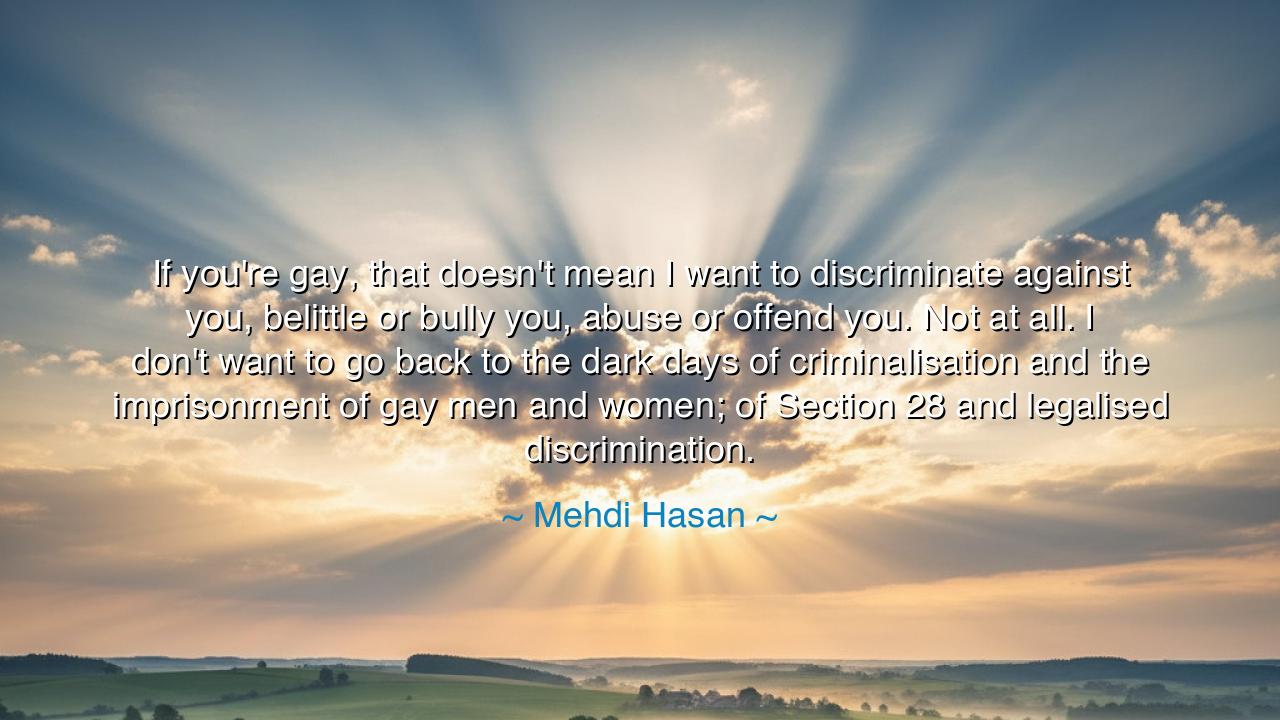
If you're gay, that doesn't mean I want to discriminate against
If you're gay, that doesn't mean I want to discriminate against you, belittle or bully you, abuse or offend you. Not at all. I don't want to go back to the dark days of criminalisation and the imprisonment of gay men and women; of Section 28 and legalised discrimination.






Hear the voice of Mehdi Hasan, journalist and truth-teller, who declares with conviction: “If you’re gay, that doesn’t mean I want to discriminate against you, belittle or bully you, abuse or offend you. Not at all. I don’t want to go back to the dark days of criminalisation and the imprisonment of gay men and women; of Section 28 and legalised discrimination.” These words are not merely political, but deeply moral; they are a reminder that dignity, once denied to many, must never again be trampled under the feet of ignorance and cruelty.
The meaning is powerful. Hasan’s words are a renunciation of hatred and an affirmation of humanity. To be gay is simply to be human, to love differently, but still to love. Yet history shows us how societies have wielded laws and prejudices as weapons against such people, branding them as criminals, treating their love as disease. Hasan stands against this, saying clearly: we must not discriminate, nor return to those dark ages when state and society alike colluded in bullying and abuse. His words shine like a torch in the night, declaring that human dignity is indivisible.
The origin of these words lies in the painful history of criminalisation. In Britain, for centuries, men and women were punished for same-sex love, facing imprisonment, exile, or worse. The infamous case of Oscar Wilde, destroyed and imprisoned for his love, stands as one of history’s cruelest reminders of this oppression. Even in recent memory, Section 28, introduced in the 1980s, forbade schools from “promoting homosexuality,” silencing teachers and isolating children who needed guidance most. Hasan’s words arise as a rebuke to this legacy, and as a vow that such days must not return.
History offers further witness. Recall the fate of Alan Turing, the brilliant mind who helped break the Nazi Enigma code and thus saved countless lives. For his service, he was not honored but persecuted, forced into chemical castration under the laws of his time. Broken by this cruelty, he ended his life in despair. Turing’s tragedy is not only a personal wound but a wound to all humanity, for how many more contributions were lost to prejudice? His story echoes Hasan’s warning: to criminalise love is to destroy genius, to rob society of its finest lights.
The danger, then, is not only in cruelty but in forgetfulness. When societies forget their own sins, they risk repeating them. When prejudice is disguised as morality, when silence becomes complicity, the shadows of discrimination return. Hasan’s words serve as a shield against this amnesia. He reminds us that the cost of those “dark days” was measured not only in broken lives but in the corruption of justice itself. To allow such cruelty again would be to abandon the very soul of humanity.
The lesson for us is clear: we must guard the dignity of every person. We must resist the temptation to divide people by their loves, their bodies, or their identities. For to bully, to belittle, to discriminate, is not merely an attack on an individual—it is an attack on the foundation of justice itself. A society that robs one group of dignity robs itself of truth, of compassion, and of greatness.
Practical action flows from this wisdom. Speak out against prejudice when you hear it. Protect the vulnerable when they are mocked or silenced. Teach children that love, in all its forms, is sacred and worthy. Support laws and leaders who defend equality, not those who seek to resurrect oppression. And above all, remember that vigilance is eternal: the dark days return only when good people remain silent.
Take this as a guiding flame: “I don’t want to go back to the dark days of criminalisation and discrimination.” Let these words be a warning and a vow. Let every generation remember that justice, once won, must be defended; that freedom, once given, must be preserved; and that love, in all its forms, is the truest expression of humanity.






AAdministratorAdministrator
Welcome, honored guests. Please leave a comment, we will respond soon